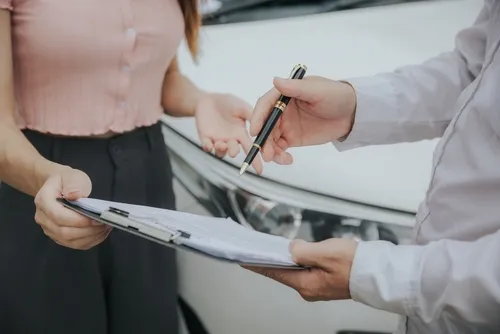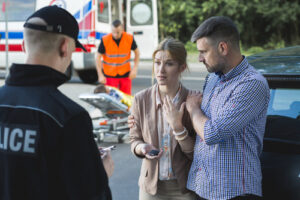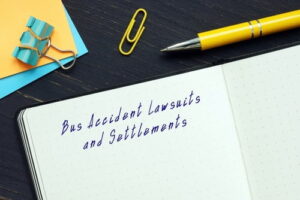If you’ve recently been involved in a car accident, you may have already received a call from an insurance adjuster asking for a recorded statement. This can be a stressful situation, especially when you’re still recovering from injuries or dealing with the aftermath of the crash.
A common question we hear from clients is, “Can I refuse to give a recorded statement to the insurance company?” The answer depends on whether your insurer or the other driver’s insurer wants a statement and what your policy requires. In either case, giving a recorded statement without legal guidance can hurt your case.
Insurance companies often use recorded statements to minimize or deny car accident claims. You should speak with a skilled Augusta car accident lawyer before giving a recorded statement to the insurance company.
At Horst Shewmaker, we help accident victims protect their rights. We can communicate with insurance companies on your behalf and fight for the compensation you deserve. Contact us today for a free consultation.
What Is a Recorded Statement in a Car Accident Case?
A recorded statement in a car accident case is an interview conducted by an insurance adjuster, where they ask you questions about the accident, your injuries, and other related details while recording your answers. These statements can be taken over the phone or in person.
Insurance companies often request recorded statements early in the claims process, sometimes within days of the accident. These statements are primarily designed to protect the insurance company’s interests, not yours. Anything you say during a recorded statement can be used later to challenge or reduce your claim.
What Questions Do Insurance Adjusters Ask in a Recorded Statement?
During a recorded interview, insurance adjusters typically ask about basic details such as when and where the car accident happened, who was involved, and what the weather was like.
However, adjusters also tend to ask leading or tricky questions designed to get you to say something that might suggest fault, minimize your injuries, or create inconsistencies in your story.
What Are the Risks of Giving a Recorded Statement After a Car Accident?
Insurance companies often present a recorded statement as a routine part of the claims process. Many accident victims don’t realize that these statements are often used to minimize or outright deny claims.
Here are some common ways insurance adjusters can use a recorded car accident statement against you.
Leading Questions
Insurance adjusters are trained to ask leading or confusing questions designed to elicit responses that may undermine your case. For example, they may ask, “You didn’t see the other car before the crash, right?” The question is phrased to get you to say “yes” even if the truth is more complicated.
Once recorded, that answer can be used to argue that you were not paying attention or were partially at fault, reducing the compensation you can receive. Adjusters may also frame questions to make it seem your injuries are minor or unrelated to the accident.
Inconsistencies in Your Story
Suppose you give a recorded statement shortly after the accident and later provide more detailed information as you learn more about your injuries or what happened. Any difference between your initial statement and later accounts may be used to challenge your credibility.
Even minor inconsistencies, such as saying the crash happened at “3 PM” in one account and “3:15 PM” in another, can be exploited to make you seem unreliable, making it harder to prove your case.
Admitting Fault
Adjusters often ask questions to get you to admit you’re partially to blame. You might be asked something like, “What could you have done to avoid the accident?” This question seems innocent but is designed to make you suggest that you were somehow responsible, even when you were not.
Any admission of fault, no matter how small, can reduce the car accident compensation you are entitled to under Georgia’s comparative negligence laws.
What If My Own Insurance Company Wants a Recorded Statement?
You may be required to provide a recorded statement if your own insurance company asks for one. Most auto insurance policies include a “duty to cooperate” clause, and failing to cooperate could lead to your claim being denied.
However, that doesn’t mean you should agree to a statement without understanding your rights. Insurance companies look for ways to limit how much they pay out. Before giving a recorded statement to your insurance company, contact an experienced Augusta car accident lawyer at Horst Shewmaker.
We can review your policy, advise you on your obligations, and prepare you to give a truthful but carefully framed statement that won’t harm your claim. In some cases, we may even be able to handle the statement on your behalf to ensure your rights are fully protected.
Should I Give a Recorded Statement to the Other Driver’s Insurance Company?
One of the most important things to know after a car accident is that you are not required to give a recorded statement to the other driver’s insurance company, and in most cases, you absolutely should not.
The other driver’s insurance company may call and act like it’s standard procedure to take your statement. They may say cooperating will make the car accident insurance claims process faster. But you are under no legal obligation to provide a recorded statement. Their goal is not to help you. Their goal is to protect their insured and pay as little as possible on the claim.
Providing a statement to the other driver’s insurer can severely hurt your chances of getting fair compensation. Any misstatements, uncertainties, or perceived contradictions can be used to dispute liability or reduce the value of your claim.
If the other driver’s insurance company asks for a recorded interview or statement, you should politely tell them to talk with your attorney. Your car accident lawyer can handle all communications with insurance companies, so you don’t have to worry about saying something that might be used against you.
How Can a Car Accident Lawyer Help with Recorded Statements?
Navigating the aftermath of a car accident can be overwhelming. With medical bills piling up, vehicle repairs, and the stress of recovery, the last thing you need is to unknowingly sabotage your claim by giving a damaging recorded statement. Here’s why having Horst Shewmaker on your side makes a difference.
We Understand Insurance Company Tactics
Our experienced Augusta car accident lawyers know how insurance adjusters operate. We’ve seen all the tricks they use to minimize payouts. We can anticipate the questions they will ask and prepare you to respond in a way that protects your case—or, when appropriate, handle those conversations on your behalf.
We Protect Your Rights and Maximize Your Compensation
By working with us before giving any recorded statement, you ensure your rights are protected from the beginning. We can also gather evidence, speak to witnesses, and build a strong case to support your claim for full and fair compensation for your medical expenses, lost wages, pain and suffering, and more.
Recorded Car Accident Statement Example
The following example of a recorded car accident statement includes an insurance adjuster’s questions and carefully worded answers that a lawyer might help you prepare.
Insurance Adjuster: “Can you describe how the accident happened in your own words?”
Prepared Answer: “Yes, I can give a general description, but I’m still in the process of understanding everything that happened. I was driving straight in my lane on Washington Road near I-20 in Augusta, Georgia. The other vehicle suddenly entered my path, and we collided. Beyond that, I’m relying on the investigation to clarify the details. My attorney has advised me to avoid speculating about anything I didn’t directly observe.”
Insurance Adjuster: “Are you injured? How are you feeling now?”
Prepared Answer: “I’ve been diagnosed with a concussion and am being evaluated by medical professionals for whiplash. I’m following my doctors’ advice and continuing treatment. My doctors say that symptoms can take time to develop fully, so I’m not in a position to give a complete assessment right now.”
Contact Our Trusted Augusta Car Accident Lawyers
If you or a loved one has been injured in a car accident, don’t let an insurance adjuster take advantage of you with a recorded statement. Before you say anything to any insurance company, call Horst Shewmaker. Our experienced Augusta car accident lawyers are ready to guide you through every step of the claims process and fight for the compensation you deserve.
We offer free consultations and handle car accident cases on a contingency fee basis, meaning you pay nothing unless we win compensation for you. You have nothing to lose by reaching out—and everything to gain in protecting your claim.
Contact us today at (404) 400-1175 or through our online form to schedule your free consultation.






